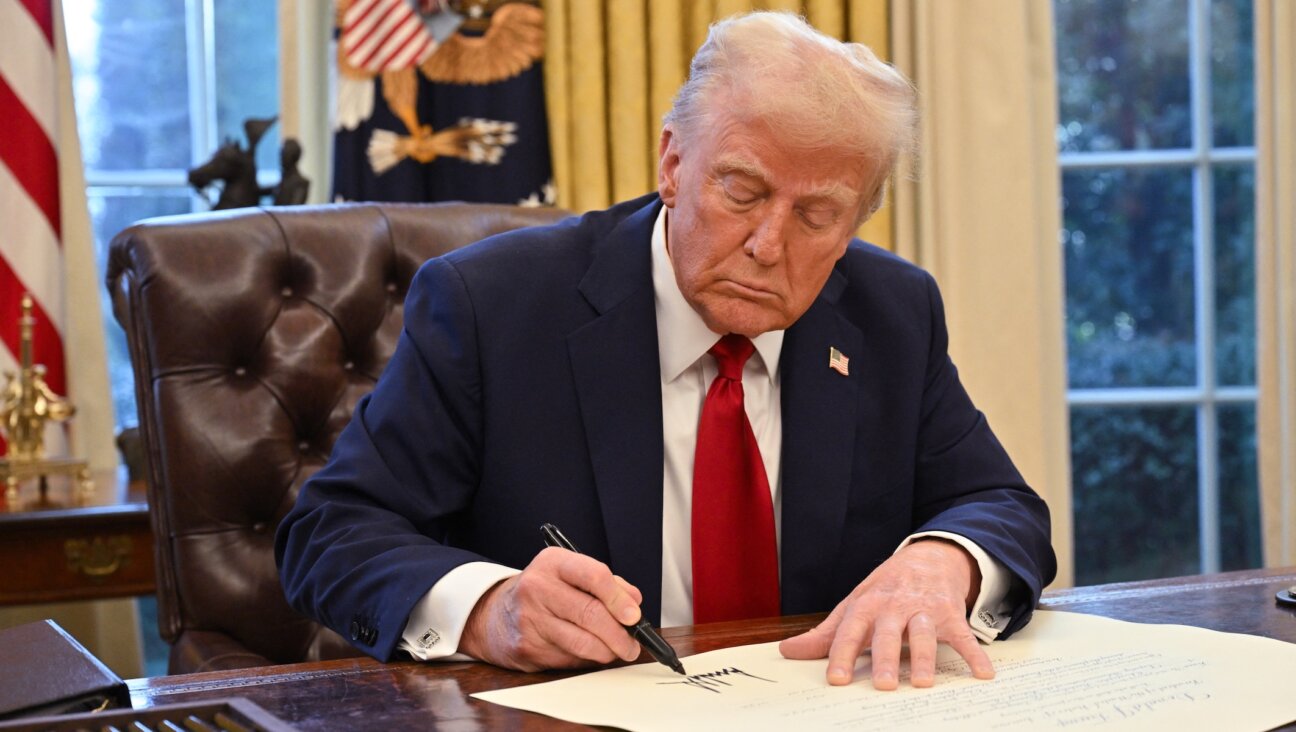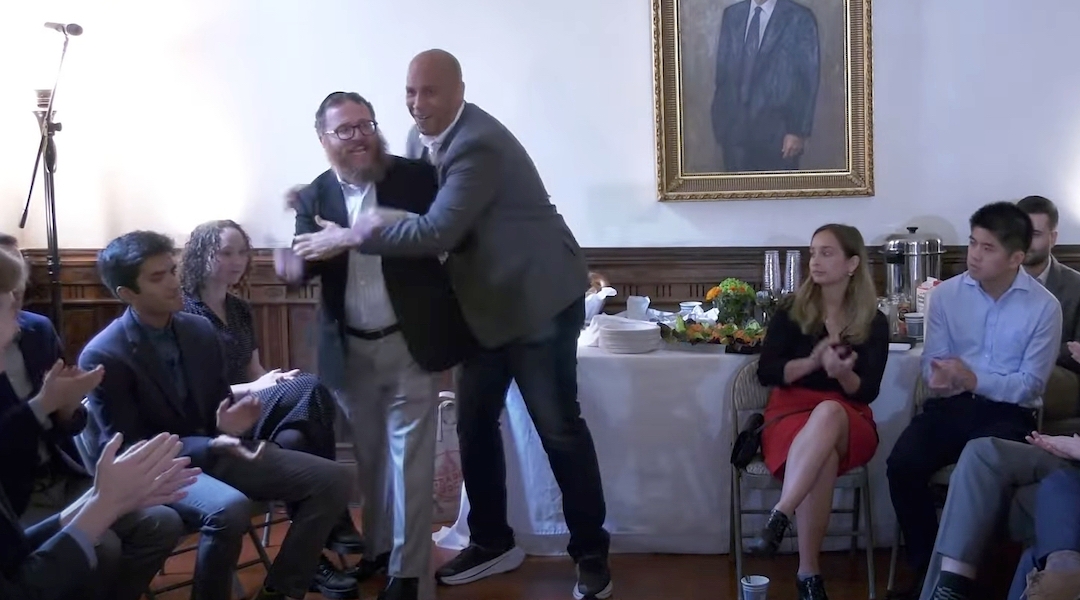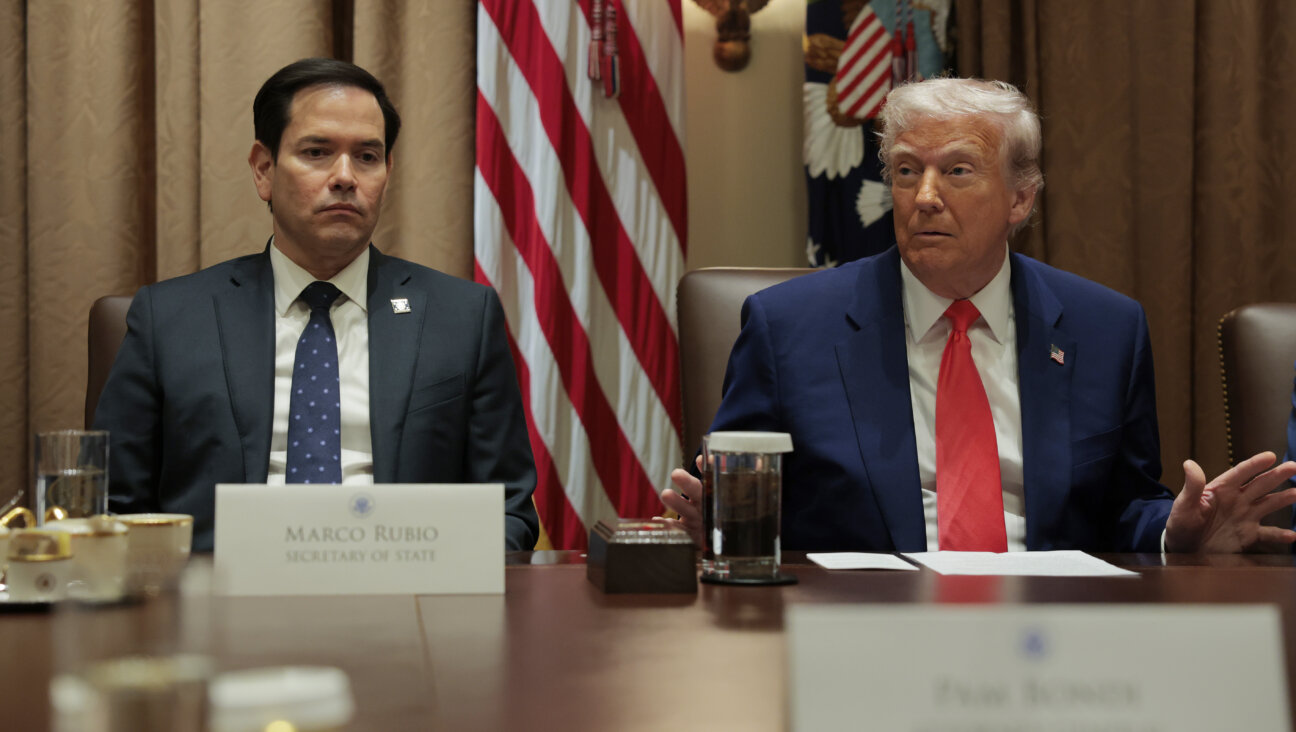War in Georgia Muddles Efforts To Confront Iran
Washington — Escalating tensions between Russia and the West over the war in Georgia are raising concerns in Israel that broken relations with Moscow might jeopardize international efforts to block Iran’s nuclear program.
Washington has threatened Moscow with diplomatic retaliation for its military operations on Georgian territory, and has hinted that it would push for a ban on Russian participation in international forums if Moscow does not cooperate with attemp ts to reach a lasting cease-fire. Israel has noticeably departed from the American line, going so far as to freeze its military ties with Georgia in an effort to placate Moscow.
Washington and Jerusalem’s divergent reactions to the war in Georgia are indicative of the split among Western policymakers on the efficacy of engaging a resurgent Russia in efforts to contain Iranian nuclear ambitions. While some have warned that shakier relations between Moscow and the West may lead to less Russian cooperation, others are citing the conflict in Georgia as evidence that Russia cannot be trusted as a diplomatic partner.
“Russia’s role is not one of pure partnership,” said Sarah Mendelson, a senior fellow at the Center for Strategic and International Studies’ Russia and Eurasia Program. “The longer we go on this path, the more difficult it will become. We will not be able to put Humpty Dumpty together again.”
Even before fighting broke out in the separatist enclave of South Ossetia, Israel took steps to curb arms sales to Georgia, in response to concerns raised in Jerusalem by Russian diplomats. After the conflict erupted, the Israeli Foreign Ministry called on the Defense Ministry, which is in charge of licensing and approving private arms sales to foreign nations, to halt permits for military assistance to the Georgian armed forces. Officials with the Israeli Defense Ministry said that defense contracts with Georgia had been halted in order to avoid further tension with Russia.
Israel’s military cooperation with Georgia is limited to the private sector and is estimated to have totaled no more than $500 million over the past decade. The assistance includes training of Georgian ground troops by former senior Israeli military officers, as well as upgrades for Georgian fighter jets and the supplying of advanced unmanned aerial vehicles. An Israeli-made Georgian UAV was shot down by Russia last May, leading to a formal Russian complaint to Jerusalem. Israel’s freezing of military ties to Georgia has not gone unnoticed in Moscow. Russia’s ambassador to the United Nations, Vitaly Churkin, told CNN on August 12 that Washington should follow Jerusalem’s example.
“Israel, which has also been one of the arms suppliers, is reconsidering its sales in the arms area,” Churkin said.
To date, the United States has dismissed Russian calls for a halt in American assistance to Georgia and is outspokenly offering diplomatic backing to President Mikheil Saakashvili.
In an August 13 statement, President Bush strongly hinted that the United States is considering punitive diplomatic measures against Russia. Flanked by Secretary of State Condoleezza Rice and Defense Secretary Robert Gates, Bush spoke of Russia’s attempts to integrate into international diplomatic and economic bodies, warning that Moscow is now “putting its aspirations at risk.”
The diplomatic actions considered against Russia include blocking its efforts to join the World Trade Organization, delaying approval of an American-Russian nuclear treaty and excluding Russia from the group of industrialized nations known as the G-8.
If the White House were to push for such measures, it would likely enjoy widespread support from Congress.
Howard Berman, chairman of the House Foreign Affairs Committee, suggested that lawmakers might withhold backing for the nuclear treaty, which requires congressional approval. Berman made clear that he is not concerned about having sanctions against Russia backfire and affect the effort to stop Iran.
“Russian cooperation on Iran has been of overwhelming importance,” Berman told Congressional Quarterly on August 11. Yet “even that priority can’t lead us to just overlooking and sweeping under the rug a massive overreaction by Russia that constitutes an invasion of a neighbor.”
By any measure, Russia wields substantial influence on efforts to resolve the Iranian nuclear crisis.
On the diplomatic front, Russia holds the key for imposing strict sanctions against Iran. Rice said earlier this month that answers provided by Tehran to a proposed deal that would halt uranium enrichment in return for an incentive package were not sufficient, and that Washington would pursue another round of sanctions at the United Nations Security Council. Such sanctions, however, would need the support of Russia, a country that, along with the other four permanent members of the Security Council, wields veto power.
On the military front, Russia could seriously complicate an Israeli air strike against Iranian nuclear facilities if it goes through with a deal to supply Tehran with advanced S-300 anti-aircraft missiles. Reports of the planned arms sale surfaced last month, but according to an Israeli diplomatic source, Moscow made clear that the deal was not finalized.
At any rate, the tough rhetoric coming from Washington is raising concern in Jerusalem. An Israeli official said that America’s wish to make clear its objection to the Russian conduct is understandable, but “we are also looking at the day after.”
The official, speaking on condition of anonymity due to the sensitivity of the issue, added that Israel sees the coming months as crucial for making progress on the diplomatic front, stating also that playing a constructive role with Iran could be a way for Russia to move beyond the conflict in Georgia.
“Cooperating on the Iranian issue can actually be Russia’s way to win back the trust of the West,” the Israeli official suggested.
The Forward is free to read, but it isn’t free to produce

I hope you appreciated this article. Before you go, I’d like to ask you to please support the Forward.
Now more than ever, American Jews need independent news they can trust, with reporting driven by truth, not ideology. We serve you, not any ideological agenda.
At a time when other newsrooms are closing or cutting back, the Forward has removed its paywall and invested additional resources to report on the ground from Israel and around the U.S. on the impact of the war, rising antisemitism and polarized discourse.
This is a great time to support independent Jewish journalism you rely on. Make a gift today!
— Rachel Fishman Feddersen, Publisher and CEO
Support our mission to tell the Jewish story fully and fairly.
Most Popular
- 1

Opinion The dangerous Nazi legend behind Trump’s ruthless grab for power
- 2

Opinion I first met Netanyahu in 1988. Here’s how he became the most destructive leader in Israel’s history.
- 3

News Who is Alan Garber, the Jewish Harvard president who stood up to Trump over antisemitism?
- 4

Opinion Yes, the attack on Gov. Shapiro was antisemitic. Here’s what the left should learn from it
In Case You Missed It
-

Fast Forward Survivors of the Holocaust and Oct. 7 embrace at Auschwitz, marking annual March of the Living
-

Fast Forward Could changes at the FDA call the kosher status of milk into question? Many are asking.
-

Fast Forward Long Island synagogue cancels Ben-Gvir talk amid wide tensions over whether to host him
-

Fast Forward Trump mandates universities to report foreign funding, a demand of pro-Israel groups
-
Shop the Forward Store
100% of profits support our journalism
Republish This Story
Please read before republishing
We’re happy to make this story available to republish for free, unless it originated with JTA, Haaretz or another publication (as indicated on the article) and as long as you follow our guidelines.
You must comply with the following:
- Credit the Forward
- Retain our pixel
- Preserve our canonical link in Google search
- Add a noindex tag in Google search
See our full guidelines for more information, and this guide for detail about canonical URLs.
To republish, copy the HTML by clicking on the yellow button to the right; it includes our tracking pixel, all paragraph styles and hyperlinks, the author byline and credit to the Forward. It does not include images; to avoid copyright violations, you must add them manually, following our guidelines. Please email us at [email protected], subject line “republish,” with any questions or to let us know what stories you’re picking up.
















